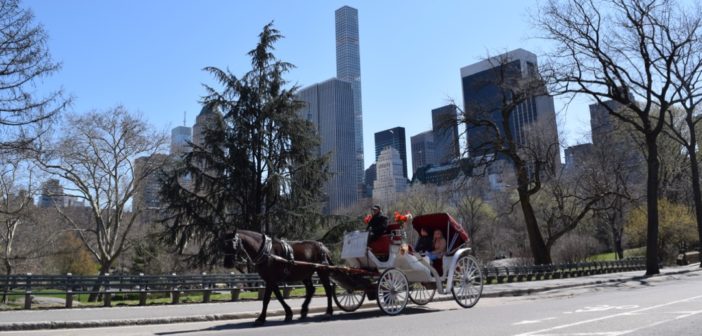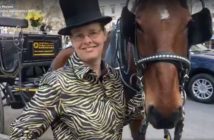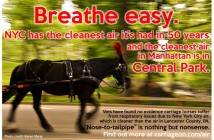HUMANE.
The American Veterinary Medical Association, the American Association of Equine Practitioners and the New York State Veterinary Medical Society all have endorsed the NYC carriage industry.
The NYSVMS has has been committed to ensuring the humane treatment of all animals throughout New York State for 125 years, and writes that “Opponents of horse-drawn carriages are also misinformed about the conditions in the carriage industry, frequently claiming that the horses are forced to live and work under inhumane conditions. A careful examination of the lives of these animals reveals the opposite. These horses, many of which are rescue animals themselves, live and work under the careful scrutiny of the veterinary profession, which follows stringent standards designed to ensure the animal’s welfare is of paramount importance.”
Carriage horses are humanely retired after working in New York City. Retiring carriage horses are highly sought after as family horses. The carriage industry partners with Blue Star Equiculture, a draft horse sanctuary in Massachusetts to provide a retirement program for adoption. You can learn more about Blue Star at www.equiculture.org.
REGULATED.
The NYC carriage industry is subject to some of the most extensive regulations concerning horses in the country. Carriage horses are overseen by 5 city agencies.
Carriage horses cannot work when it is too hot or too cold. (Above 89 degrees or below 19 degrees.)
Carriage horses cannot work more than 9 hours per day.
Carriage horses must get at least 5 weeks vacation every year.
Carriage horses must live in box stalls large enough to turn around and lie down comfortably.
Carriage horses and their stables are inspected regularly by the NYPD Mounted Unit, the Department of Health and the Department of Consumer Affairs.
SAFE.
Carriage rides are among the safest of all equestrian activities. The general public can enjoy interacting with horses without having to sign a waiver. Carriages are fully licensed and insured, and such insurance can be had for less than the cost of insuring a private car in NYC. The risk to horses and humans is extremely low. You are more likely to have a tree fall on you in Central Park than a passenger or horse is to be injured.
In fact, Charles Komanoff of Streetsblog.org has reviewed the data and concluded that horse-drawn carriages are the safest vehicles in midtown Manhattan.
HEALTHY.
Carriage horses live long, healthy lives. Every equine vet who has examined the NYC carriage horses has remarked on their good health.
Carriage horses are well-fed and watered. At the stable they get all the good quality hay they can eat. At work they get quality horse feed and carrots. They always have water at the stable, and while at work there are two water troughs that operate year round. Carriage horses can be watered at any time.
Carriage horses are sound. Walking on asphalt actually makes their job easier. A 2008 study by Cornell veterinarian Dr. James Lowe found virtually no lameness in NYC carriage horses.
Carriage horses are not stressed by the city. A 2014 study by Dr. Joe Bertone of Western University of cortisol levels in NYC carriage horses concluded that carriage horses have exceedingly low levels of cortisol while working in the city, and that they appear to be more stressed while on vacationing on the farm.
Dr. Stephen O’Grady from Virginia made an independent visit to the carriage stables in 2013 and concluded that the stables were very clean, with spacious stalls. He also remarked that carriage horses receive excellent farrier (hoof) care.
Every equine vet who has visited the stables or the hackline has remarked on the lack of respiratory issues in NYC carriage horses.
POLITICAL.
The controversy over the carriage horses is ideological and political. It has nothing to do with the actual well-being of the horses.
Some people are opposed to carriage horses because they support “animal rights.” They believe that humans have no right to own or work with animals, including dogs or cats, and that humans should not eat meat. Animal rights activists believe in “total animal liberation” and seek an end to domesticated animals. This is a radical ideology or opinion not based on facts.
“Animal rights” is very different from “animal welfare.” People who support animal welfare believe that human beings have a responsibility to take good care of animals and treat them well. People who support animal welfare believe that human experience is improved by living and working with animals. The carriage industry believes very strongly in animal welfare for our horses and for all animals.
Anti-carriage groups, like NYCLASS, have intervened in our political process in NYC, using millions to help elect Bill de Blasio mayor in 2013. De Blasio had promised to ban carriages his first day in office. He and NYCLASS are now under investigation by the US Attorney for NYCLASS’s donations to him.
The four carriage stables in Hell’s Kitchen sit on very valuable real estate, much of which has been rezoned in recent years for high-rise luxury condos. The carriage horses are in the way of real estate development.
BELOVED.
Repeated scientific polls conducted by Quinnipiac University of New York City voters have shown that New Yorkers overwhelmingly oppose banning carriage horses and want their iconic horses to stay.
The NYC carriage industry is endorsed by the New York Times, the New York Daily News, the New York Post, the Amsterdam News, the Wall Street Journal, AM New York, and many more local media outlets who have investigated the industry.
The carriage horses are supported by the Manhattan Chamber of Commerce and the International Brotherhood of Teamsters.
The carriage horses are a NYC icon, having appeared in dozens of movies and TV shows.
In January and February of 2016, the New York City Council held hearings into the carriage industry. Experts from the city agencies that oversee the carriages testified that there are no outstanding concerns about the health or safety of the carriage horses. Upon reviewing their testimony and the facts presented by equine experts, the City Council rejected any effort to ban or further restrict carriage operations in New York City.
Carriage horses have been working in Central Park since 1858, which is 41 mayors… and counting! They’re not going anywhere, and will continue to delight visitors and New Yorkers alike for generations to come. Carriage on!
Download this information as a .pdf trifold brochure here: What You Should Know About The New York City Carriage Horses





26 Comments
Pingback: Improving Carriage Horse Welfare | The Naturally Healthy Horse
I saw a horse today breathing very hard no water and the gypsy driver took the horse out again in that condition we had a heat advisory and it was 91 degrees I called the police and the aspca the police came and made them take the horses in it made me sick my kids where crying what is wrong with are city are they that money hungry. someone should be out there every day checking on these poor animals I will take this as far as I can go this is wrong…….
Having just returned from a trip to NYC loved the place have been before, but I would never go on a horse and carriage. One horse carrying a carriage with 3/4 people. Is that right or fair? When I mentioned to one of the owners their horse looked tired and maybe needed a drink I was met with abuse. Only would someone who was guilty react like that. He said he had 7 horses so I replied let’s hope you look after them better. Broke my heart to see some of the horses in very hot conditions.
For real? A “Gypsy”? racist statement in a public forum. Shame on you for making up BS and slamming someone who’s skin you’ve used to be cruel.
These horses stand half on the street and half on the sidewalk is that unhealthy yes it is and in 91 degrees heat how sick is that no water for most
I will take this to the top wouldn’t u if u saw wt I did today a trip into our great city sick
I have had horses all my life this is not a life for a horse they are beautiful animals not to be abused
white horses are prone to cancer from the sun having them stand there all day like that it makes me sick
HAVING CARRIAGE HORSES IS A FORM OF ABUSE IN EVERY WAY, SHAOE OR FORM! I AM POSITIVE THAT IF THE HORSES COULD TALK, THEY WOULD SAY THAT THEY DO NOT WANT TO BE CARRIAGES HORSES! WOULD BET ON IT! THEY WOULD SAY THAT THEY’RE TIRED, IT’S TOO HOT AND IT’S TOO COLD! WHAT REALLY MAKES YOU THINK THAT THEY ENJOY IT! LAST THING THEY WANT TO DO AND BEING FORCED TO DO SOMETHING AGAINST THEIR WILL IS CALLED ABUSE! IT’S ANIMAL ABUSE! THE OTHER PEOPLE THAT DONT SEE IT AS ANIMAL ABUSE ARE THE ONES THAT HAVE NO LOVE OR COMPASSION FOR ANIMALS BECAUSE IF YOU DID, YOU WOULD PUT YOURSELF IN THEIR PLACE! HOW WOULD YOU FEEL TO HAVE TO BE TOLD WHEN TO GO, WHEN TO STOP, HOW LONG TO STAND IN WHATEVER WEATHER! IF YOU CAN’T BE THEIR VOICE, YOU ARE PART OF THE PROBLEM! PEOPLE THAT WORK OR USE CARRIAGE HORSES ARE INSENSITIVE AND INCONSIDERATE! IT’S INHUMANE! YOU CAN DEFINITELY TELL A LOT ABOUT A PERSON’S CHARACTER IN HOW YOU TREAT ANIMALS! I WONDER IF THE SHOE WERE ON THE OTHER FOOT, IF PEOPLE WOULD COMPLAIN! HOPE ONE DAY WE COULD PUT THAT TO THE TEST!
Do your horses do anything besides stand in a field? Do you ride them? If so isn’t that against their will? When you ride then dont you make them go where YOU want them to go? People still plow fields with horses, the horse probably doesn’t want to do that either. They probably didn’t want to be ridden across the old West either. They are animals. They have a purpose. You can own one and be it for riding, carriage rides, or plowing as long as it’s treated well (as any animal should be) then people need to get over it and mind their own business.
Good to know you believe animals only exist to serve mankind. Jeezus.
Pingback: What’s Wrong With Working Horses? – Life With A Standardbred
I was in New York City today and called out a handler who shoved the horses head. I said be nice to the horses and she shot me a dirty look. Say what you want but there’s no way you can guarantee those animals are properly cared for by all employees.
I have a hard time believing those horses are healthy and happy. Those are not animal friendly conditions and some of those people hiring could use a nice walk in the oppressive heat themselves.
I was in a carraige stable last night – while the stalls were clean and box stalls the floor looked like concrete with very little if any bedding. The hay was yellow and poor quality. Most of the horses heads were tied as the stalls had no doors. While the conditions were far from
Luxurious most of the horses seemed content and friendly. I would have liked to see some more weight on many. While it’s nice to read the horses get vacations it would be nice if their stabling had windows and turn out. I know not possible at that location but horses are not meant to live in high rises. This particular stable had three floors 10-12 per floor
Would love to offer a retirement home to any carriage horse!
I had no reason to not believe your comments about horse care until I read about the “no lame” carriage horses part. What bullshit! Just driving or walking around Manhattan, I can’t remember how many times I’ve seen incredibly lame or incredibly stiff and arthritic horses trotting (sort of) down the street. Trotting on asphalt is hard on legs. And getting five weeks of vacation only makes them unfit to go back to work. A horse needs to get a couple of hours outside every day, not an extended period once a year.
And reading the comment from Sam on October 7, 2018 — if their heads are tied, then the box stall is a moot point. You just turned the box stall into a standing stall. And poor quality hay and inadequate bedding and ventilation? Owning a horse is prohibitively expensive, and astronomically so in NYC. Either do it right or get out of the game.
Pingback: Christmas in New York - 10 Best Things to do in NYC for the Holidays
I saw SEVERAL- COUNTLESS- horses working in 95+ degree heat in NYC recently. They were struggling to pull the weight of the carriage and experiencing labored breathing. They were also stepping in piles of their own poop.
I announced loudly this was animal cruelty, and the slave owner (carriage “driver”) called me a fat cunt.
I told him he should be ashamed of himself.
For the record, I’m not even fat- not that it matters.
He did an excellent job of proving my point that these carriage drivers are very cruel and disgusting.
This article is inaccurate propaganda in a desperate attempt to invalidate the argument that these horsre abused and enslaved. The horse carriage industry is dying. For a good reason. Don’t support this outdated and inhumane industry. Walking is healthier anyway.
Dirty carriage drivers, just animal abusing scum. I flip them off when I see them and verbally abuse them. Its the least I can do for all the abuse they give the horses. If any of you fat carriage drivers think because I love animals, have compassion and a heart that I am weak you best think twice. Just remember I’ll let you hit me first and I’ll gladly defend myself.
AAEP supports horse slaughter, so it’s only natural that this disingenuous organization is aligned with New York’s carriage trade.
you could check here https://mostbetsport.com
Visit this site right now https://www.ontvtime.ru/
only the latest news. Hundreds of new reviews every day.
Would you like me to determine you which full-grown webcam site has the best pornstar sexual intercourse cams online?
Not single does this special handling showcases the hottest and horniest beauties of the XXX industries and allows its members to rap with them busy – it also makes all this happen after free.
Now I gamble I got your distinction today, don’t I?
Grandly, If I had to disregard the article, you fool to deliver assign to it – complement each other find minus which sensational website has this phenomenal offer.
https://sexcam.cx
https://alfa124.com
zq9900